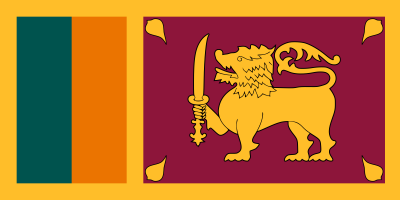Sri Lanka Slammed the “Indo-Pacific” Concept as a Threat to China and Russia

Somewhat surprisingly, tiny Sri Lanka has emerged as the loudest voice in South Asia opposing the “Indo-Pacific” concept that New Delhi and Washington are jointly pursuing, pointing out how it’s “aimed at restraining China and even the Greater Eurasia by creating military unions between countries”, but the strong statement issued by the Sri Lankan Ambassador to Russia might also have been intended to alter the dynamics of his country’s ongoing “deep state” civil war.
Small State, Loud Voice
Tiny Sri Lanka has been making global headlines ever since the Easter terrorist attacks last month, but the latest official statement coming out of the country hasn’t received the press that it deserves. The Sri Lankan Ambassador to Russia gave an interview to his host country’s prestigious publicly funded international media outlet TASS where he praised the idea that President Putin originally put forth during his speech at the UN General Assembly in September 2015 for forging an inclusive anti-terrorist coalition, but it was what he said afterwards that truly deserves international attention, at least within the South Asian region. On the topic of forming military blocs, he said that:
“As for military pressure, it will take the world back to the colonial era but we are living in the 21st century. In the past, military methods were used to put pressure on economically emerging countries. Such practices are completely unacceptable, they damage the idea of peaceful co-existence. There is a project such as ASEAN, which focuses on Asian countries. This project is more worthy of respect than the so-called Indo-Pacific project aimed at restraining China and even the Greater Eurasia by creating military unions between countries.”
Russia’s “Return To South Asia”
In other words, he contrasted Russia’s calls for an inclusive anti-terrorist coalition without ulterior motives to be secretly used against any state-level third parties with the exclusive transregional military bloc being created by the US and India with the tacit purpose of “containing” China and even Russia. It’s actually for this reason why Russian Foreign Minister Lavrov condemned the “Indo-Pacific” in February as an “artificially imposed” pro-American concept immediately prior to Moscow officially returning to South Asia by offering to host Indo-Pak peace talks in order to restore “balance” to this externally destabilized region. In parallel with that, Russia endorsed Pakistan’s geostrategic importance and fully committed itself to China’s Belt & Road Initiative (BRI).
Sri Lanka’s “Deep State” Civil War
Returning to the specific news item that inspired the present analysis, there are likely several interconnected reasons why the Sri Lankan Ambassador to Russia slammed the “Indo-Pacific” concept. The first is that he probably wanted to impress his hosts and signal that his country is in strategic alignment with them on this very important issue, but remembering the high level of Indian influence in his country since the 2015 elections narrowly unseated civil war hero former President Rajapaksa as a result of RAW’s meddling, his move might be part of Sri Lanka’s ongoing “deep state” civil war between pro-Indian liberals and pro-sovereignty conservatives.
This could especially be the case if Sri Lanka was secretly approached by the US and/or India to join the “Indo-Pacific” concept shortly after its disastrous terrorist attacks in exchange for so-called “anti-terrorist” assistance. Sri Lanka remembers India’s support for the LTTE terrorist group, and while the pro-Indian liberals seemingly don’t care, the rising pro-sovereignty conservatives obviously do and would therefore be opposed to joining the “Indo-Pacific” concept in principle in order to preserve their country’s sovereignty and avoiding voluntarily turning it into an Indian vassal state that would certainly be abused by its new patron. This isn’t mere speculation either since Ambassador Dayan Jayatilleka is a close ally of former President Rajapaksa.
The UK-based online opposition outlet “Colombo Telegraph” noted around the time of his nomination as Sri Lanka’s Ambassador to Russia that the former Permanent Representative to the United Nations in Geneva is former President Rajapaksa’s “close confidante”. It also published a leaked email between him and the former President late last year where Ambassador Jayatilleka blamed the country’s political crisis on the US and urged the country’s then-Prime Minister to mobilize society in order to defeat the counterrevolution. He proudly defended his words but clarified that they were written in a private capacity. This proves without a doubt that Ambassador Jayatilleka is a true believer in the emerging Multipolar World Order just like his Russian hosts are.
Concluding Thoughts
In any case, there should be no question that while the reportedly left-leaning Ambassador Jayatilleka isn’t a conservative, he definitely isn’t a liberal either, but regardless of how one would classify his political beliefs, such a description shouldn’t leave out that he’s strongly in support of Sri Lanka’s sovereignty. With his country’s ongoing “deep state” civil war as the contextual background to his sharp criticism of the “Indo-Pacific” concept, it becomes clear that his words represent the official policy of President Sirisena, former President Rajapaksa’s recent ally, and are intended to thwart whatever devious plans their rivals are pursuing to exploit the latest terrorist attacks in order to subjugate Sri Lanka to joint Indo-American hegemony.
*
Note to readers: please click the share buttons below. Forward this article to your email lists. Crosspost on your blog site, internet forums. etc.
This article was originally published on Eurasia Future.
Andrew Korybko is an American Moscow-based political analyst specializing in the relationship between the US strategy in Afro-Eurasia, China’s One Belt One Road global vision of New Silk Road connectivity, and Hybrid Warfare. He is a frequent contributor to Global Research.

